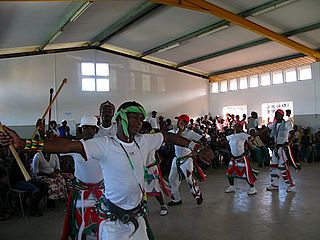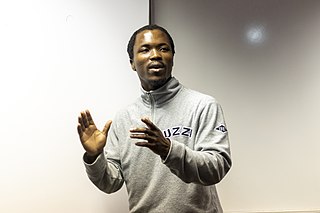
Nokuthula Mabaso, (1981/1982 – 5 May, 2022) was a prominent leader in Abahlali baseMjondolo [1] [2] [3] and one of the leaders of its women's league. She was a leader in the eKhenana Commune. [4] [5] She was assassinated on 5 May 2022. [6] [7]

Nokuthula Mabaso, (1981/1982 – 5 May, 2022) was a prominent leader in Abahlali baseMjondolo [1] [2] [3] and one of the leaders of its women's league. She was a leader in the eKhenana Commune. [4] [5] She was assassinated on 5 May 2022. [6] [7]
She was instrumental in developing the Commune's food sovereignty project. [8]
In April 2020 she successfully interdicted the eThekwini Municipality against carrying out illegal evictions against the residents of eKhenana. [9]
Mabaso opposed the commodification of land and explained that in eKhenana "We made a collective decision that we would not sell or lease any piece of land here in eKhenana." [10]
On 8 October 2021 she was arrested along with Thozama Mazwi and Sindiswa Ngcobo, all members of the eKhenana branch of Abahlali baseMjondolo. [11] The arrests were part of a spate of arrests of about a dozen movement members and were widely seen as politically motivated. All charges were later dropped. [12] [13] [14]
Mabaso was assassinated in the presence of her children in her home at the eKhenana Commune, in Cato Manor, Durban, South Africa on 5 May 2022 . [15] [16] [17] She left behind a husband and four children. [18] [19] She was shot seven times. [20]
Two months before she was murdered she had witnessed the assassination by five gunmen of Ayanda Ngila, also a leader in the eKhenana Commune. The movement Abahlali baseMjondolo claims that she was murdered because of her activism and specifically after she decided to become a state witness fingering Khaya Ngubane as one of the perpetrators. [21] She was laid to rest at her family home at Esidumbini near Tongaat. [22] [23] [24] After Mabaso was killed, Khaya Ngubane was denied bail in the Ngila case. [25]
On the 26 July 2022, a pastor named Samson Ngubane (who leads a Zionist church in Mayville) as well as his brother Mhlanganyelwa Ngubane, who are also the father and uncle of Khaya Ngubane, were arrested for their involvement in Mabaso's assassination. On 6 September 2022, both accused were denied bail. [26] [27] [28] [29]
Following the assassination of Mabaso and two other activists in eKhenana - Ayanda Ngila and Lindokuhle Mnguni - the killings were condemned in a letter from over 130 civil society organisations. [30] The assassination of Abahlali baseMjondolo activists was also discussed at the 51st sessions of the United Nations Human Rights Council in 2022. [31]
Cato Manor is a settlement located 7 kilometres (4.3 mi) from the city centre of Durban, South Africa.

Abahlali baseMjondolo is a socialist shack dwellers' movement in South Africa which primarily campaigns for land, housing and dignity, to democratise society from below and against xenophobia.
The "Third Force" was a term used by leaders of the ANC during the late 1980s and early 1990s to refer to a clandestine force believed to be responsible for a surge in violence in KwaZulu-Natal, and townships around and south of the Witwatersrand.

Sibusiso Innocent Zikode is president of the South African shack dwellers' movement, which he co-founded with others in 2005. Abahlali baseMjondolo claims to have an audited paid up membership of over 115 000 across South Africa. His politics have been described as 'anti-capitalist'. According to the Mail & Guardian "Under his stewardship, ABM has made steady gains for housing rights."

Kennedy Road is an informal settlement in Durban (eThekwini), in the province of KwaZulu-Natal in South Africa. Formed in the late 1970s or early 1980s, the settlement was mentioned by the African National Congress (ANC) after the end of apartheid but amenities were not improved. The site is mostly not connected to sanitation or electricity. Dissatisfaction with local councillors led to 2005 protests including a road blockade, out of which the shack dwellers movemment Abahlali baseMjondolo (AbM) formed. In 2009, an AbM meeting was attacked resulting in two deaths and a court case. More recently, the municipality has improved facilities and promised to relocate inhabitants.

The Landless People's Movement is an independent social movement in South Africa. It consisted of rural people and people living in shack settlements in cities. The Landless People's Movement boycotted parliamentary elections and had a history of conflict with the African National Congress. The Landless People's Movement was affiliated to Via Campesina internationally and its Johannesburg branches to the Poor People's Alliance in South Africa.
No Land! No House! No Vote! is the name of a campaign by a number of poor people's movements in South Africa that calls for the boycotting of the vote and a general rejection of party politics and vote banking. The name is meant to imply that if government does not deliver on issues important to affected communities these movements will not vote.
Rubin Phillip is bishop of the Anglican Diocese of Natal. The great-grandchild of indentured labourers from Andhra Pradesh, Phillip is the first person of Indian heritage in South Africa to hold the position of Bishop of Natal. He grew up in Clairwood, a suburb of Durban with a large concentration of people of Indian descent, in a non-religious household, but converted to Christianity. He was a noted anti-apartheid activist and spent three years under house arrest in the 1970s and was banned in 1973. He was enthroned as bishop in February 2000.
Mnikelo Ndabankulu lives in Durban, South Africa. He was the spokesperson for Abahlali baseMjondolo up until May 2014 and appears in the film Dear Mandela.
The attack on Kennedy Road in Durban, South Africa, occurred on 26 September 2009. A mob of men armed with bush knives, guns and bottles entered the Kennedy Road informal settlement searching for leaders of the shackdwellers movement Abahlali baseMjondolo (AbM). They looted shacks and threatened residents, before attacking a hall where a youth meeting was happening. Two people were killed and around a thousand were displaced. In the aftermath, AbM representatives such as S'bu Zikode went into hiding and thirteen AbM members were arrested.
The Constitution of South Africa protects all basic political freedoms. However, there have been many incidents of political repression, dating back to at least 2002, as well as threats of future repression in violation of this constitution leading some analysts, civil society organisations and popular movements to conclude that there is a new climate of political repression or a decline in political tolerance.
There have been many political assassinations in post-apartheid South Africa. In 2013 it was reported that there had been more than 450 political assassinations in the province of KwaZulu-Natal since the end of apartheid in 1994. In July 2013 the Daily Maverick reported that there had been "59 political murders in the last five years". In August 2016 it was reported that there had been at least twenty political assassinations in the run up to the local government elections on the 3rd of August that year, most of them in KwaZulu-Natal.
In March 2013 around a thousand people occupied a piece of land in Cato Crest, Durban and named it Marikana after the Marikana miners' strike. Mayor James Nxumalo blamed the occupation on migrants from the Eastern Cape. He was strongly criticised for this by the shack dwellers' movement Abahlali baseMjondolo who said that "The City Hall is red with blood".
Bandile Mdlalose was the general secretary of the South African shackdwellers' movement Abahlali baseMjondolo. She is now the President of the Community Justice Movement which operates in some informal settlements of Gauteng and KwaZulu Natal.
Nqobile Nzuza was a resident in the Marikana Land Occupation in Cato Crest, which is part of Cato Manor in Durban, South Africa. She was a member of the shackdwellers' movement Abahlali baseMjondolo.
Nkululeko Gwala originally from Inchanga in KwaZulu Natal, was a resident of Cato Crest, which is part of Cato Manor in Durban, and a supporter of the Marikana Land Occupation (Durban). He was also a prominent member of the shackdwellers' social movement Abahlali baseMjondolo and chairperson of their Cato Crest Branch. He was assassinated on 26 June 2013.

Ayanda Ngila (1992–2022), was a land activist, a prominent leader in the shack dweller's movement Abahlali baseMjondolo and deputy chairperson of its eKhenana Commune. He was assassinated on 8 March 2022.

The eKhenana Commune is a prominent land occupation in the historic working-class area of Cato Manor in Durban, South Africa. According to the Socio-Economic Rights Institute "The eKhenana settlement is organised as a cooperative in which residents collectively run a communal kitchen and tuck shop, theatre, poetry and music projects, and care for a vegetable garden named after the late Nkululeko Gwala [assassinated in 2013] as well as a poultry farm named in honour of the late S’fiso Ngcobo [assassinated in 2018]. The Commune has solar power and is also home to a political school that residents named the Frantz Fanon School, as well as the Thuli Ndlovu Community Hall [Ndlovu was assassinated in 2014]. The Commune has suffered sustained political repression, including multiple arrests and three assassinations in 2022.

Lindokuhle Mnguni was a land activist and a prominent leader in the shack dwellers' movement Abahlali baseMjondolo. He was chairperson of the movement's youth league as well as the chairperson of the eKhenana Commune. He was a leader of eKhenana's food sovereignty project which sought to make the commune more self-sustaining and independent. He was assassinated on 8 August 2022.